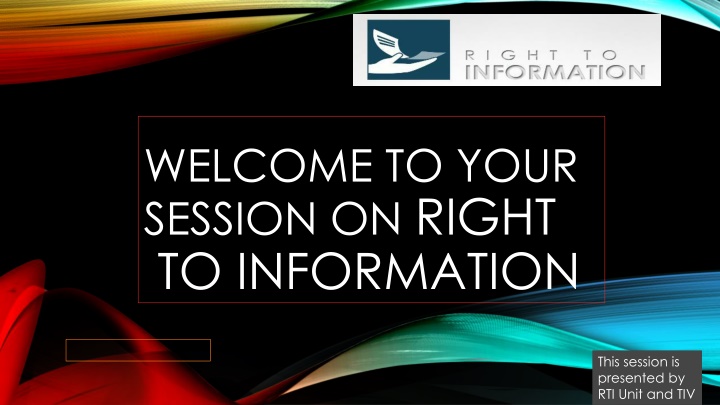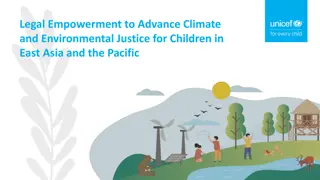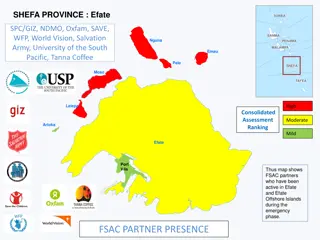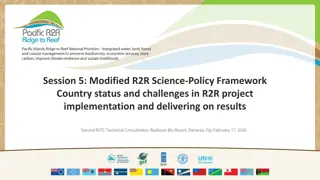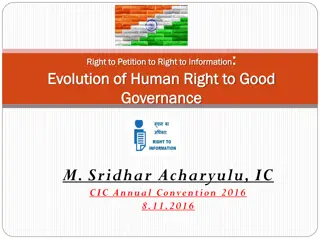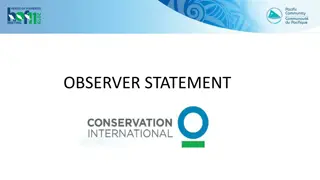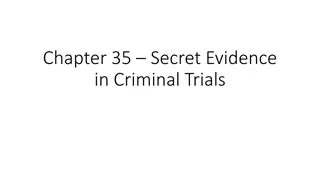Right to Information and its Implementation in Vanuatu
The session on Right to Information (RTI) aims to enlighten participants on access to information, its importance in community participation, and the process of obtaining information. Vanuatu's commitment to RTI is evident through the National RTI Policy and Act, aligning with global conventions for transparency and accountability. The government's vision is to provide open, accountable, and participatory governance for all.
Download Presentation

Please find below an Image/Link to download the presentation.
The content on the website is provided AS IS for your information and personal use only. It may not be sold, licensed, or shared on other websites without obtaining consent from the author.If you encounter any issues during the download, it is possible that the publisher has removed the file from their server.
You are allowed to download the files provided on this website for personal or commercial use, subject to the condition that they are used lawfully. All files are the property of their respective owners.
The content on the website is provided AS IS for your information and personal use only. It may not be sold, licensed, or shared on other websites without obtaining consent from the author.
E N D
Presentation Transcript
WELCOME TO YOUR SESSION ON RIGHT TO INFORMATION This session is presented by RTI Unit and TIV
OBJECTIVE OF THIS SESSION To enlighten participants on what RTI is all about How RTI can help you How you can use the law to help build you status in the community How RTI can help you participate in decision-making process of your community, island or nation The process to obtaining information What you must do to ensure you get what you want Have a general knowledge on what government must do to implementing RTI
WHAT IS RIGHT TO INFORMATION Right to information refers to a citizen's right to access information that is held by the state. In many countries, this freedom is supported as a constitutional right.
A BRIEF OF RTI IN VANUATU The National RTI Policy 2014 and the RTI Act No. 2016 signals the Government of Vanuatu s continuing commitment to the recognition of access to information as a human right, and as a cornerstone of fundamental democratic principles of good governance. Nationally, the Policy represents part of a broader strategy of improved governance under the Comprehensive Reform Programme (CRP), the National Priority Action Agenda and the Leadership Code and the National SDG. Internationally, it honours, to a large extent, a number of conventions to which Vanuatu is a signatory, including the United Nations Convention Against Corruption (UNCAC), which Vanuatu ratified in mid-2011. Regionally, the Policy is in line with Vanuatu s commitments under the 2005 Regional Pacific Plan. The development of this policy is also timely in other respects, coming at a time when there is considerable interest in right to information on the part of civil society and the media, and with global development partners increasingly requiring greater transparency and accountability from aid recipients.
Governments RTI Vision: To provide open, accountable and participatory government for all the people of Vanuatu. MISSION Statement It is our mission to promote the recognition of the right to information as a universal right in Vanuatu, guide public officials, the media, civil society and the public by providing a clear framework for accessing and disseminating information and provide an opportunity for a structured, comprehensive approach to the development of an improved and sustainable information management system across the public sector.
THE EXPECTATION OF RIGHT TO INFORMATION RTI would signal a culture change that would make a dramatic change to the way Vanuatu is governed Its introduction will signal a new relationship between government and people: a relationship that will see the public as legitimate stakeholders in the running of the country and sees election to serve the public as given on trust.
BENEFICIARIES OF RTI 1. Citizens or the general public at large It gives greater understanding of how government functions And consistent access to government records reduces impropriety and corruption It increases knowledge of the activities and structure of the government Encourages participation in decision-making It empowers citizens 2. Government It helps to improve and better manage government records Consistently and proactively releasing information builds trust, demonstrates commitment to transparency and shows that both government and politicians understand that they are accountable to the public that they serve.
GOVERNMENTS INSTITUTIONAL STRUCTURE FOR IMPLEMENTING RTI For an RTI law to be effective it needs to be supported by active implementation measures and supported by an institutional framework to undertake this task. (RTI National Policy, RTI Legislation & implementation Plan) There are three key institutional mechanisms for implementing RTI laws. Firstly, it is very useful to establish a focal point in the government to provide guidance and to monitor implementation. (RTI Unit) Secondly, each public authority needs to appoint a dedicated RTI officer to receive and process requests. Often this official is also responsible for leading on the putting in place other systems as required by the law. Finally, the law has provided for the establishment of an independent oversight body, known as an information commission or commissioner, which has the power to review complaints relating to requests and often also has a role in promoting awareness of the right.
KNOWLEDGE IS POWER, INFORMATION IS LIBERATING Kofi Anan Former secretary general of the United Nations
OVERALL OBJECTIVE OF RTI To reinforce and give further effect to certain fundamental principles, underlying the system of constitutional democracy, Transparency Accountability, and Public participation in national decision-making by granting to the public a general right of access to records held by public authority
CENTRALIZED SUPPORT FROM THE RTI UNIT The RTI Unit is the specialised unit to provide leadership and Support Functions such as:- RTI Unit Manager : Harold Obed Co-ordination of implementation Training of RTI Practitioners Responding to agencies questions Monitoring and Reporting Sustainability of implementation Public education (role dedicated) Records Management Officer: June Naviti
WHAT & WHO DOES RTI LAW COVER? WHAT Records. Information held in any form. WHO Vanuatu Government public authorities Ministries, portfolios, departments, statutory authorities, government companies, boards and committees Extended to private companies and organisations that receive government appropriations and that provide a service important to welfare of Vanuatu society
IT STRATEGY GIS Content writer to ensure standard content on www.gov.vu website for each public authority Provision of RTI e-mail addresses for all public authorities Upgrade of RTI website to provide information for the public and practitioners www.rti.gov.vu Web Accessibility Guideline
WHERE RTI LAW CONFLICTS WITH OTHER LAWS, THE RTI LAW OVERWRITES THAT OTHER LAW BASED ON PUBLIC INTEREST If a record is exempted, but on balance, the factors favouring disclosure outweighs or are equal to those favouring non- disclosure, it may be released if it is in the public s interest.
NOW, WHAT DOES THE LAW SAY ABOUT RTI , AND HOW CAN THIS RTI LAW HELP A CITIZEN INCLUDING YOURSELF?? Answer: Under the RTI Law, government must: (1) A Government agency or a relevant private entity must publish and disseminate an initial statement of its organization in each official language, including the following: (a) a description of its structure, functions and duties; and (b) a list of the entities falling under it including their location, opening hours, and subjects handled; and (c) the title, business address and contact details of the principal administrative officer; and (d) the particulars of its finances; and (e) a directory of its officers and employees and a brief description of the powers and duties of its officers and employees; (f) the procedure followed in the decision making process, including channels of supervision and accountability; and (g) a simple guide to its information-keeping systems; and (h) a statement of the types and forms of information and categories of documents that are held by it or used by its employees in the discharge of its functions; and
DISCLOSURE CONTINUES (i) relevant details concerning any services it provides directly to members of the public; and (j) the content of all decisions or policies it has adopted which affect the public, along with the reasons for them, any authoritative interpretations of them and any important background material; and (k) the particulars of any arrangement that exists for consultation with or representation by the members of the public in relation to the formulation of its policy or implementation; and (l) the procedure to be followed in making an application for information, the particulars of facilities available to citizens for obtaining information, including the working hours of a library or reading room, if maintained for public use; and (m) any direct application or complaints mechanisms available to members of the public regarding acts or a failure to act by that body, along with a summary of any applications, complaints or other direct actions by members of the public and that Government agency s response; and (n) the names, designations, contact details and other particulars of its Right to Information Officers; and (o) such other information deemed necessary in the public interest or as may be prescribed by this Act or any other Act.
DEFINITION OF RECORDS UNDER THE RTI LAW Under the RTI law, you have the right to ask any information from government held records record means information held in any form or medium by a Government agency, relevant private entity or private entity, whether or not it was created by any of them or came into existence before the commencement of this Act, and includes: (a) a record in writing; or (b) a document, manuscript and file; or (c) a film (including microfilm), negative, microfiche and facsimile copy of a document; or (d) a map, plan, graph or drawing; or (e) a photograph; or (f) a disc, tape, sound track or other device in which sounds or other data are embodied, whether electronically or otherwise, so as to be capable (with or without the aid of some other equipment) of being reproduced; or (g) an email, memo, opinion, advice, press releases, circular, order, logbook, contract, report, samples and models;
WHAT ELSE MUST GOVT DO? Government must appointment RTI officers in all its agencies What is the RTI officer s role? a) Promote best practice b) Receive request and make decision on each application c) Assist individuals seeking information d) receive complaints e) Ensure full compliance with RTI law
HOW CAN I MAKE AN RTI Phone calls Emails Online In person Text message REQUEST? An application can be made in writing, orally or through any electronic means, in any official language, and to the relevant Government agency, relevant private entity or private entity, specifying the information required.
WHAT SORT OF REQUEST CAN I MAKE? You can seek information about anything of any age that is not exempted under the law. An application to access any records held by a public authority A request for information that would not have been released before the RTI law came into effect
AND, IF I AM ON A DIFFERENT ISLAND SEEKING INFORMATION FROM RTI OFFICER IN A GOV T AGENCY IN PORT VILA? The application must include the following information: (a) a postal address, fax number or email address (b) a telephone number; and (c) the form of access required; and (d) the language in which the information granted is to be supplied.
WHAT ARE OTHER BASIC FUNDAMENTALS OF RTI? Applicants are able to inspect, copy or listen to official records held by public authorities You are able to ask for your own personal information that is held by government to be changed if you think it is incorrect The RTI law does not require the creation of a document, but it may require a collation of information
DECISION ON AN APPLICATIONS The Right to Information Officer has, within 30 days of receiving the Application to: (a) determine whether or not to grant the application; and (b) notify the applicant of his or her decision in writing; and (c) if the application is granted, subject to the payment of any fee, give the applicant access to the information. d) Public authorities may extend this period once for another 14 calendar days, only in instances of reasonable cause
DECISION ON AN APPLICATIONS CONTINUES . 2) If an application relates to information that appears to be necessary to safeguard the life or liberty of a person, the Right to Information Officer must, within 48 hours of receiving the application: (a) determine whether or not to grant the application; and (b) notify the applicant of his or her decision in writing; and (c) if the application is granted - grant the applicant access to the information.
DECISION ON AN APPLICATION CONTINUES . The public authority may: 1. Grand full access 2. Grand partial access 3. Extend the time for response 4. Refuse access to exempt records 5. Refuse to comply with the request 6. Defer the request to another relevant agency 7. Tell the applicant how to access the record outside of RTI procedure 8. Inform the applicant no records exist
EXEMPTION IN THE RTI LAW Personal information Legal privilege Commercial confidential, Public economic interests National security and Law enforcement Health and safety, Heritage sites and the environment Policy making and operations of agencies
ON WHAT GROUNDS CAN A REQUEST BE REFUSED A public authority does not have to comply with an application at all if: Information requested is under exemption The request is vexatious; The public authority has already complied with the similar request from the same person; The address is not completed
JUDICIAL REVIEW Final appeals from applicant, third parties or public authorities maybe taken to the Supreme Court
PENALTIES UNDER THE RTI LAW An offence committed under the RTI Act can only be made by a government officer, and not a member of the general public (1) A person who: directs, proposes, counsels or causes any person in any manner to do any thing under the law, commits an offence punishable on conviction to a fine not exceeding VT500,000 or by a term of imprisonment not exceeding 1 year, or both.
IMPLEMENTATION PROVISION UNDER RTI LAW The bill provides for the phase implementation of its provisions of two and a half years (30 months). Phase implementation means that the entities that the law will apply, by order made by Prime Minister who is responsible for the Act, be allowed to commence the administration of the Act. First Order comes within 6 months from gazettal of Act Second Order within the next 2 years Third comes at the end 2 years
END BLONG PRESENTESEN
Session ya, TIV nao I sponsarem TANK YU OLGETA BLONG SAVE FOLEM MIFALA!
